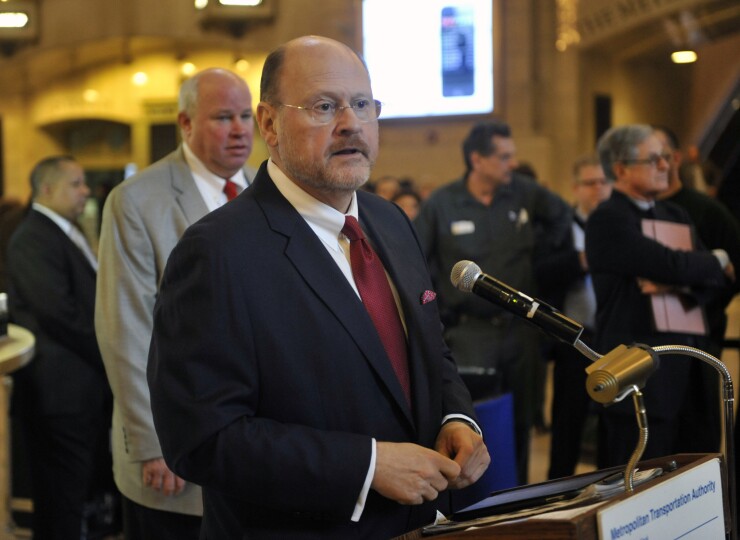The Metropolitan Transportation Authority’s planned subway-improvement program for New York triggered pushback from board members Wednesday who say Gov. Andrew Cuomo is overreaching.
The MTA is a state authority that runs metropolitan New York mass transit.
Board member James Vitiello said Cuomo’s emergency decree for the MTA in late June amounted to an unfunded mandate. Cuomo at the time said New York State would provide additional $1 billion for the authority’s capital program without specifying how the state would pay for it.

The MTA’s $32 billion capital plan includes a $2.5 billion pledge from New York City, funds the authority still hasn't received.
“The order, when unaccompanied by any actual cash payment, to me it seems to like to address the problem by exacerbating the problem,” Vitiello, a Dutchess County representative and executive vice president of Vitech Systems Group, said at the monthly board meeting.
“We have some serious financial problems. As chairman of [the audit committee,] I do lie awake at night and wonder I how will not see some financial crisis in my lifetime.”
Fellow board members Susan Metzger, Veronica Vanterpool and Neal Zuckerman all said they need more time to act on serious financial proposals.
“These things do require soak time,” Zuckerman said.
The MTA, a state authority and one of the largest municipal issuers, has $39 billion of bond debt. Vitiello said that amount reaches $60 billion including unfunded benefit liabilities.
According to Vitiello, provisions of Cuomo’s executive order to streamline procurement could leave the MTA exposed to lawsuits from frustrated contractors.
Chairman and Cuomo appointee Joseph Lhota said he would detail the budgetary implications and revenue sources for his subway plan at the October board meeting, one month ahead of schedule. Board members traditionally get a briefing in November and vote on the formal presentation one month later on the operating budget.
“I jumped in full-speed ahead because I thought the deterioration was happening on a moment-to-moment basis,” Lhota said.
The preliminary spending plan for 2018 is $15.9 billion.
Over the summer, Lhoto said initial triage for the subways would cost about $856 million, $380 million of that out of the capital budget. This would involve signal and track maintenance, train car reliability, safety and cleanliness, customer communications and what he called a “critical management group.”
Lhota, a former city budget chief in Mayor Rudolph Giuliani’s administration, also said the authority will not spend more money or hire new personnel outside the approved budget.
He said the MTA’s so-called genius contest, a Cuomo initiative inviting proposals from firms to modernize the system, has received 438 submittals from 23 countries. “It’s being winnowed down,” Lhota said.
The board also authorized the issuance of up to $600 million in new-money Triborough Bridge and Tunnel Authority Series 2017-2018 bond anticipation notes.
Proceeds will fund approved bridge and tunnel capital projects, director of budgets Douglas Johnson told members of the finance committee on Monday.
The measure also includes a reimbursement resolution, which federal tax law requires, to preserve the issuance of tax-exempt debt.





